Unit 1 Lesson 1 New friends, new subjects自主学习与合作探究 课件(共43张PPT)-冀教2024版英语八上
文档属性
| 名称 | Unit 1 Lesson 1 New friends, new subjects自主学习与合作探究 课件(共43张PPT)-冀教2024版英语八上 | 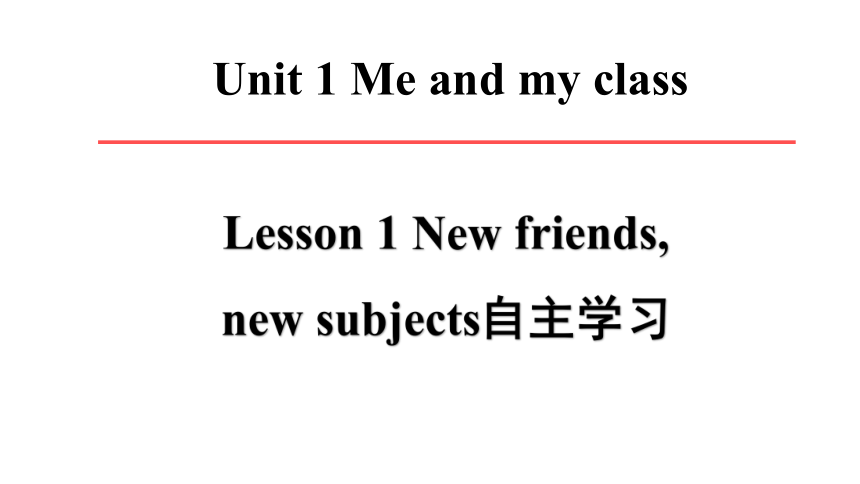 | |
| 格式 | pptx | ||
| 文件大小 | 202.9KB | ||
| 资源类型 | 教案 | ||
| 版本资源 | 冀教版 | ||
| 科目 | 英语 | ||
| 更新时间 | 2025-05-19 15:37:00 | ||
图片预览

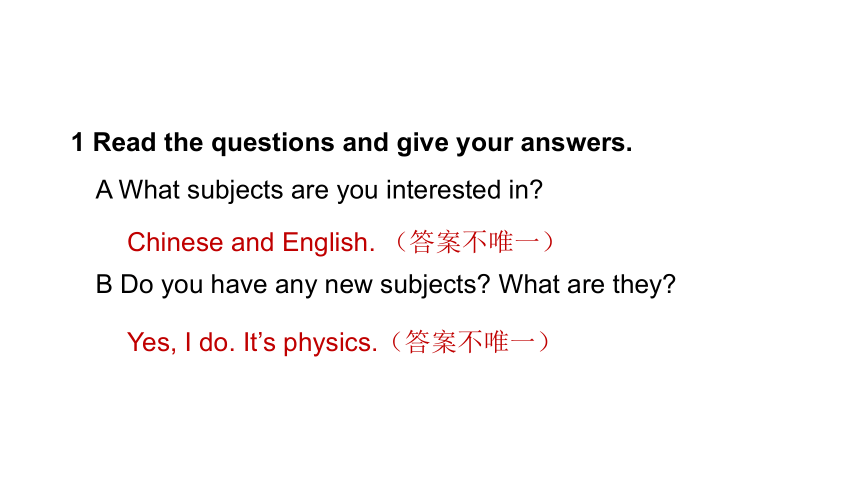
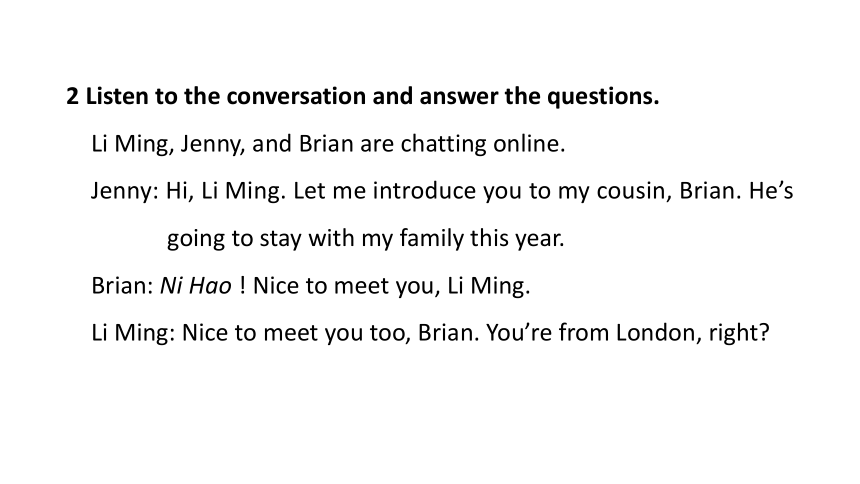


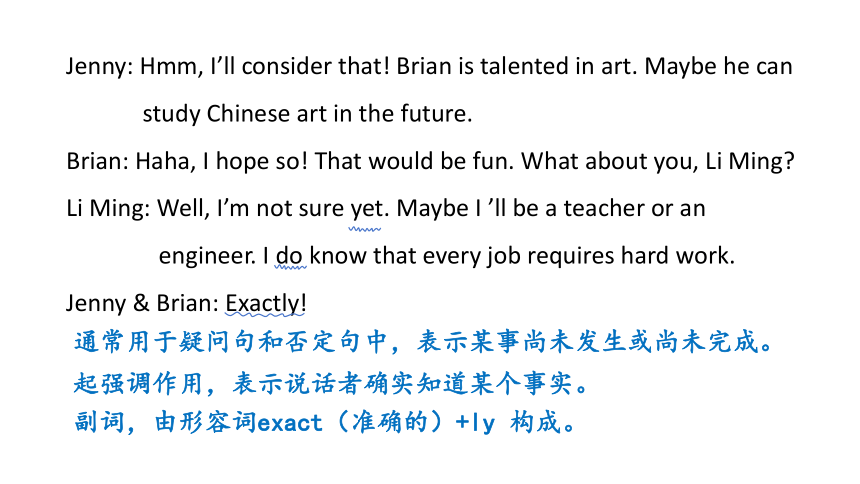
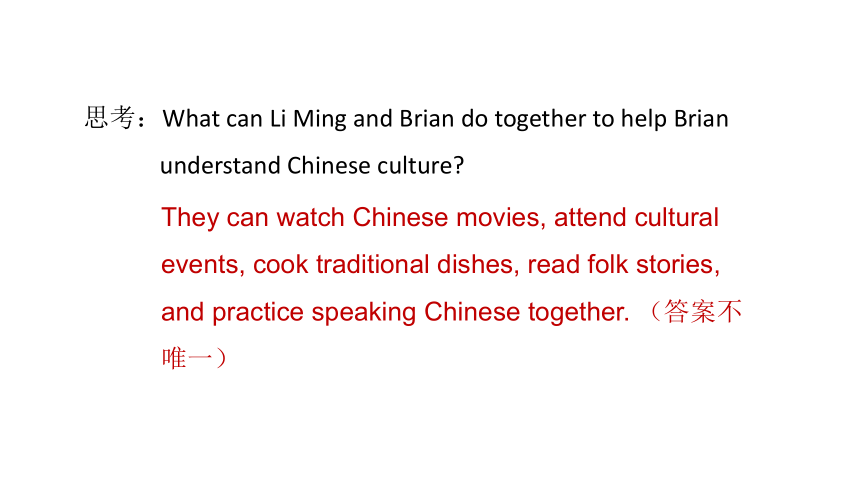

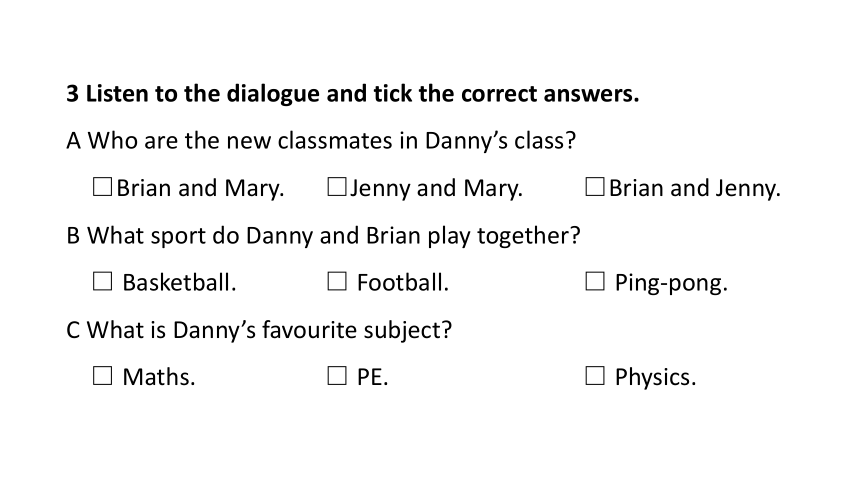
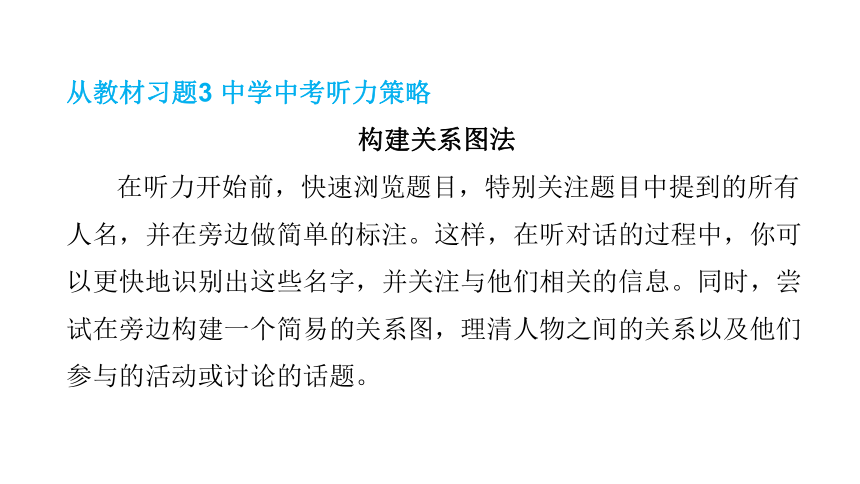

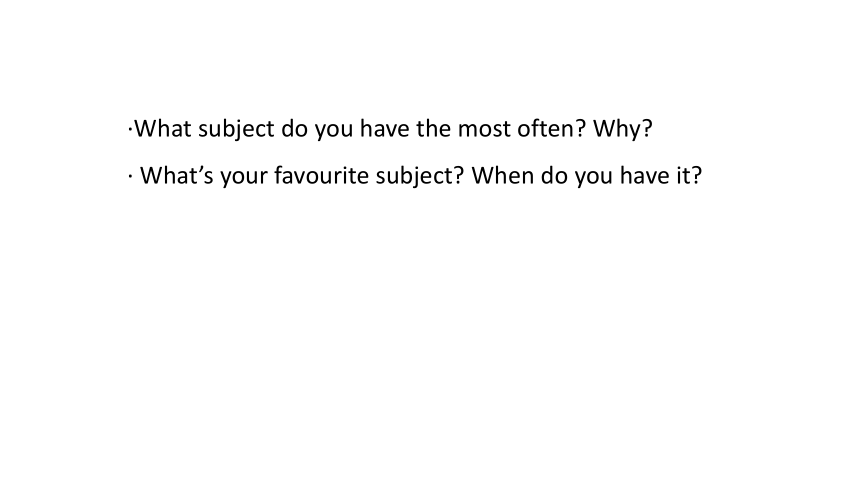
文档简介
(共43张PPT)
Lesson 1 New friends,
new subjects自主学习
Unit 1 Me and my class
1 Read the questions and give your answers.
A What subjects are you interested in
B Do you have any new subjects What are they
Chinese and English. (答案不唯一)
Yes, I do. It’s physics.(答案不唯一)
2 Listen to the conversation and answer the questions.
Li Ming, Jenny, and Brian are chatting online.
Jenny: Hi, Li Ming. Let me introduce you to my cousin, Brian. He’s going to stay with my family this year.
Brian: Ni Hao ! Nice to meet you, Li Ming.
Li Ming: Nice to meet you too, Brian. You’re from London, right
Brian: Yes, and I am very interested in Chinese culture. I hope you can help me with it.
Li Ming: No problem! We can learn together.
Jenny: Speaking of learning, how’s Grade 8 going for you, Li Ming
长难句分析:这是一个主从复合句。主句为I hope, you
can help me with it 为宾语从句,作hope 的宾语;从句中
的主语为you, 谓语为can help, 宾语为me。
用于询问“进展如何”或“情况怎样”。
Li Ming: It’s going well. It’s similar to Grade 7. We have a new subject this term — physics. It seems interesting. How about you
Jenny: I’m learning a new language — French.
Li Ming: That’s great, Jenny. You’re good at learning languages.
Jenny: Thanks, Li Ming.
Li Ming: Today at school, we talked about our future jobs. Jenny, perhaps you can be a language teacher.
相当于maybe。
Jenny: Hmm, I’ll consider that! Brian is talented in art. Maybe he can study Chinese art in the future.
Brian: Haha, I hope so! That would be fun. What about you, Li Ming
Li Ming: Well, I’m not sure yet. Maybe I ’ll be a teacher or an engineer. I do know that every job requires hard work.
Jenny & Brian: Exactly!
通常用于疑问句和否定句中,表示某事尚未发生或尚未完成。
起强调作用,表示说话者确实知道某个事实。
副词,由形容词exact(准确的)+ly 构成。
思考:What can Li Ming and Brian do together to help Brian understand Chinese culture
They can watch Chinese movies, attend cultural events, cook traditional dishes, read folk stories, and practice speaking Chinese together. (答案不唯一)
A What is Brian interested in
B How is Grade 8 going for Li Ming
C What new subject does Li Ming have this term
D What new language is Jenny learning
Chinese culture.
It’s going well.
Physics.
French.
3 Listen to the dialogue and tick the correct answers.
A Who are the new classmates in Danny’s class
□Brian and Mary. □Jenny and Mary. □Brian and Jenny.
B What sport do Danny and Brian play together
□ Basketball. □ Football. □ Ping-pong.
C What is Danny’s favourite subject
□ Maths. □ PE. □ Physics.
从教材习题3 中学中考听力策略
构建关系图法
在听力开始前,快速浏览题目,特别关注题目中提到的所有人名,并在旁边做简单的标注。这样,在听对话的过程中,你可以更快地识别出这些名字,并关注与他们相关的信息。同时,尝试在旁边构建一个简易的关系图,理清人物之间的关系以及他们参与的活动或讨论的话题。
4 Make a desired timetable for yourself and discuss with your classmates.
Day 日期 Time 时间 Monday 星期一 Tuesday 星期二 Wednesday 星期三 Thursday 星期四 Friday
星期五
·What subject do you have the most often Why
· What’s your favourite subject When do you have it
探究一 核心单词
Unit 1 Me and my class
1 chat /t t/ v. & n. 聊天;闲聊
· We often chat with each other on social media platforms. 我们经常在社交媒体平台上彼此聊天。
· Let’s have a chat about our plans for the weekend.
让我们聊聊周末的计划吧。
chat 的一词多义:(1)作不及物动词,意为“聊天;闲聊”,常见用法:chat with sb. 和某人聊天。
(2) 作可数名词,意为“聊天;闲聊”,常见用法:have a chat 闲谈;聊天。
2 online / n'la n/ adv. 在线 adj. 在线的;联网的
· We often chat with our grandparents online on weekends. 我们周末经常和爷爷奶奶在线聊天。
· My friend is online and we can play a game together.
我的朋友在线,我们可以一起玩个游戏。
· Make sure your device is online before you start the video call. 在你开始视频通话前,请确保你的设备已经联网。
· The online bookstore has a lot of interesting books.
这家在线书店有很多有趣的书。
online 的一词多义:(1)作副词,意为“在线”,修饰动词,表示动作或状态是在网络上进行的。(2) 作形容词,意为“在线的,联网的”,在句中作定语,修饰名词,放在名词前面。
常见短语:online shopping 网络购物;online game 网络游戏;get online 上网;online help 联机帮助;online services 在线服务;online bookstore 在线书店。
3 introduce / ntr 'dju s/ v. 介绍: 引进
· Let me introduce myself. My name is Lily.
让我自我介绍一下。我叫莉莉。
· Can you introduce me to your teacher
你能把我介绍给你的老师吗?
· The company introduced a new product to the market.
这家公司向市场推出了一款新产品。
introduce 作动词,意为“介绍;引进”。常见结构:
(1)introduce oneself 自我介绍
(2)introduce sb. to sb. 把某人介绍给某人
(3)introduce sth. (to/into sth.) 把某物引入(到某物)
introduce 的名词形式是introduction,意为“介绍;引进”。
4 similar /'s m l (r)/ adj. 类似的;相像的
· The two stories have a similar plot, but the endings are different. 这两个故事有相似的情节,但结局不同。
· This book is similar to that one. 这本书和那本书相似。
· The two brothers are similar in appearance.
这两兄弟在外貌上很相似。
similar 作形容词,意为“类似的;相像的”,可作定语或表语。常见用法:(1)be similar to... 和……相似(2)be similar in sth. 在某方面相似
5 consider /k n's d (r)/ v. 考虑;认为
· We are considering buying a new car.
我们正在考虑买一辆新车。
· We consider him honest. 我们认为他是诚实的。
· We’re considering when we will hold the English party.
我们正在考虑什么时候举办英语派对。
· My mom considers our pet dog as part of the family.
我妈妈把我们的宠物狗当作家庭的一员。
consider 作动词,意为“考虑;认为”。常见用法:
(1)consider doing sth. 考虑做某事
(2) consider+sb./sth.+ 名词/ 形容词/ 动词不定式 认为某人/ 某物是……
(3)consider + 宾语从句 认为……
(4)consider... as... 把……看作……
6 yet /jet/ adv. 还 conj. 但是;然而
· I haven’t finished my homework yet. 我还没有完成作业呢。
· I want to go out, yet it’s raining.我想出去玩,但是正在下雨。
· I have already finished my homework.
我已经完成我的作业了。
· Supper is already ready. 晚餐已经准备好了。
yet 副词,谈论尚未发生但可能发生的事。常用于否定句(意为“还;仍然”)或疑问句(意为“已经”)。
yet 还可作连词,意为“但是;然而”。
辨析:yet 与already
yet 都可表示“已经” 多用在现在完成时的否定句或疑问句中,yet 通常位于句尾。
already 可以用在现在完成时或一般现在时的肯定句中,already 一般位于助动词或be 动词之后,行为动词之前,还可以位于句尾。
7 engineer /end 'n (r)/ n. 工程师
· My dad is an engineer. He designs buildings.
我爸爸是一名工程师,他设计建筑物。
· She dreams of being an engineer.
她梦想成为一名工程师。
engineer 可数名词,意为“工程师”;表示一个工程师冠词用an。本课出现的表示职业的名词有:teacher 教师;painter 画家;油漆工。
常见的表示职业的名词有:
(1) 以-er 结尾的职业名词:worker 工人;teacher 教师
(2) 以-or 结尾的职业名词:doctor 医生;editor 编辑
(3) 以-ist 结尾的职业名词:scientist 科学家
(4)以-ian 结尾的职业名词:musician 音乐家
(5) 以-man 结尾的职业名词:postman 邮递员
8 require /r 'kwa (r)/ v. 需要;要求
· This project requires a lot of time and effort.
这个项目需要大量的时间和精力。
· The task requires working overtime.
这项任务需要加班完成。
· The teacher requires us to do our homework every day.
老师要求我们每天做作业。
· The regulations require that all employees wear safety helmets. 规定要求所有员工都必须戴安全帽。
· Where’s my eraser I need it.我的橡皮在哪里?我需要它。
· You need to drink some water. 你需要喝些水。
require 作动词,意为“需要;要求”。常见用法:
(1)require+ 名词/ 代词,表示“需要某物/ 某人”。
(2) require+ 动名词,表示“需要做某事”。动名词作宾语,表示需要进行的动作。
(3)require+ sb. +to do sth. 表示“需要某人做某事”。
(4) require + that 从句,表示“要求……;规定……”。that 引导的宾语从句中,通常使用虚拟语气,谓语动词用“should+动词原形”或直接用动词原形,should 可以省略。
辨析:require 与need
require “需要;要求”,后接从句(用虚拟语气,情态动词should 可省略),后不可接不定式主动形式,不作情态动词。
need “需要”,后不接从句,后可接不定式主动形式,作情态动词(后跟动词原形,多用于疑问句和否定句中)。
探究二 核心短语
Unit 1 Me and my class
1 speak of 提及
· People often speak of her kindness and generosity with great admiration.
人们常常带着钦佩之情谈论她的善良和慷慨。
· I want to speak for myself and say that I didn’t do it.
我想为自己辩解一下,说这件事不是我做的。
· Speak of the devil! There he is now.
说曹操曹操到!他现在就在那儿。
speak of 常用短语,意为“提及”。
由speak 构成的常用短语还有:
speak up 大声地说;把话说清楚;speak out 大胆地说出(意见、想法等);直言不讳;speak for oneself 为自己说话;表达自己的观点或感受;speak of the devil (某人正好在此时出现)说曹操曹操到;speak one’s mind 坦率地表达自己的想法或意见。
2 be talented in 在……方面有才能
· Tom is talented in math, and he always gets good grades.
汤姆在数学方面很有天赋,他总是取得好成绩。
· She is active in participating in school activities.
她积极参加学校活动。
· He is weak in public speaking. 他在公开演讲方面很弱。
be talented in 由“be + 形容词 + i n”构成,意为“在……方面有才能”。
常用的类似结构的短语还有:(1)be active in 活跃于
(2)be confident in 对……有信心
(3)be interested in 对……感兴趣
(4)be rich in 在……方面富有
(5)be strict in 对……严格
(6)be successful in 在……方面成功
探究三 核心句式
Unit 1 Me and my class
1 What subjects are you interested in 你对什么科目感兴趣?
分析结构“What subjects are you interested in ”是一个常见的英语问句,用于询问对方对哪些学科感兴趣。What subjects 是句子的疑问词部分,用于询问“什么学科”; are 是be 动词,表示“是”的意思; you 是主语,表示询问的对象; interested in 表示“对……感兴趣”。
· Who is your favorite author 你最喜欢的作家是谁?
· What is your main hobby 你的主要爱好是什么?
· Which city is the capital of France 法国的首都是哪个城市?
该句结构为:特殊疑问词+ 一般疑问句?回答这类问句时,需要准确地提供与特殊疑问词相对应的信息。
常见的特殊疑问句:what(什么),why(为什么),when(什么时候、何时),who(谁),where(在哪里),how(如何、怎样)等。
2 What about you, Li Ming 那你呢,李明?
分析结构 What about... 是一个询问意见或提出建议的
句型,后面跟名词或者动名词。
· What about your new job 你的新工作怎么样?
· We can’t go to the park today. What about going to the museum instead
我们今天不能去公园了。改去博物馆怎么样?
· How about having a picnic this weekend
这个周末去野餐怎么样?
What about... 用于询问对方对某个建议、活动或情况的看法,意思是 “…… 怎么样?”。可以用来提出替代方案或选择。
What about... 与How about... 可以互换使用。在回答How about... 的问题时,可以用“Good idea!”好主意!“Sounds great!”听起来很棒!“I’m sorry, I can’t.”对不起,我不能。等表达自己的态度。
Lesson 1 New friends,
new subjects自主学习
Unit 1 Me and my class
1 Read the questions and give your answers.
A What subjects are you interested in
B Do you have any new subjects What are they
Chinese and English. (答案不唯一)
Yes, I do. It’s physics.(答案不唯一)
2 Listen to the conversation and answer the questions.
Li Ming, Jenny, and Brian are chatting online.
Jenny: Hi, Li Ming. Let me introduce you to my cousin, Brian. He’s going to stay with my family this year.
Brian: Ni Hao ! Nice to meet you, Li Ming.
Li Ming: Nice to meet you too, Brian. You’re from London, right
Brian: Yes, and I am very interested in Chinese culture. I hope you can help me with it.
Li Ming: No problem! We can learn together.
Jenny: Speaking of learning, how’s Grade 8 going for you, Li Ming
长难句分析:这是一个主从复合句。主句为I hope, you
can help me with it 为宾语从句,作hope 的宾语;从句中
的主语为you, 谓语为can help, 宾语为me。
用于询问“进展如何”或“情况怎样”。
Li Ming: It’s going well. It’s similar to Grade 7. We have a new subject this term — physics. It seems interesting. How about you
Jenny: I’m learning a new language — French.
Li Ming: That’s great, Jenny. You’re good at learning languages.
Jenny: Thanks, Li Ming.
Li Ming: Today at school, we talked about our future jobs. Jenny, perhaps you can be a language teacher.
相当于maybe。
Jenny: Hmm, I’ll consider that! Brian is talented in art. Maybe he can study Chinese art in the future.
Brian: Haha, I hope so! That would be fun. What about you, Li Ming
Li Ming: Well, I’m not sure yet. Maybe I ’ll be a teacher or an engineer. I do know that every job requires hard work.
Jenny & Brian: Exactly!
通常用于疑问句和否定句中,表示某事尚未发生或尚未完成。
起强调作用,表示说话者确实知道某个事实。
副词,由形容词exact(准确的)+ly 构成。
思考:What can Li Ming and Brian do together to help Brian understand Chinese culture
They can watch Chinese movies, attend cultural events, cook traditional dishes, read folk stories, and practice speaking Chinese together. (答案不唯一)
A What is Brian interested in
B How is Grade 8 going for Li Ming
C What new subject does Li Ming have this term
D What new language is Jenny learning
Chinese culture.
It’s going well.
Physics.
French.
3 Listen to the dialogue and tick the correct answers.
A Who are the new classmates in Danny’s class
□Brian and Mary. □Jenny and Mary. □Brian and Jenny.
B What sport do Danny and Brian play together
□ Basketball. □ Football. □ Ping-pong.
C What is Danny’s favourite subject
□ Maths. □ PE. □ Physics.
从教材习题3 中学中考听力策略
构建关系图法
在听力开始前,快速浏览题目,特别关注题目中提到的所有人名,并在旁边做简单的标注。这样,在听对话的过程中,你可以更快地识别出这些名字,并关注与他们相关的信息。同时,尝试在旁边构建一个简易的关系图,理清人物之间的关系以及他们参与的活动或讨论的话题。
4 Make a desired timetable for yourself and discuss with your classmates.
Day 日期 Time 时间 Monday 星期一 Tuesday 星期二 Wednesday 星期三 Thursday 星期四 Friday
星期五
·What subject do you have the most often Why
· What’s your favourite subject When do you have it
探究一 核心单词
Unit 1 Me and my class
1 chat /t t/ v. & n. 聊天;闲聊
· We often chat with each other on social media platforms. 我们经常在社交媒体平台上彼此聊天。
· Let’s have a chat about our plans for the weekend.
让我们聊聊周末的计划吧。
chat 的一词多义:(1)作不及物动词,意为“聊天;闲聊”,常见用法:chat with sb. 和某人聊天。
(2) 作可数名词,意为“聊天;闲聊”,常见用法:have a chat 闲谈;聊天。
2 online / n'la n/ adv. 在线 adj. 在线的;联网的
· We often chat with our grandparents online on weekends. 我们周末经常和爷爷奶奶在线聊天。
· My friend is online and we can play a game together.
我的朋友在线,我们可以一起玩个游戏。
· Make sure your device is online before you start the video call. 在你开始视频通话前,请确保你的设备已经联网。
· The online bookstore has a lot of interesting books.
这家在线书店有很多有趣的书。
online 的一词多义:(1)作副词,意为“在线”,修饰动词,表示动作或状态是在网络上进行的。(2) 作形容词,意为“在线的,联网的”,在句中作定语,修饰名词,放在名词前面。
常见短语:online shopping 网络购物;online game 网络游戏;get online 上网;online help 联机帮助;online services 在线服务;online bookstore 在线书店。
3 introduce / ntr 'dju s/ v. 介绍: 引进
· Let me introduce myself. My name is Lily.
让我自我介绍一下。我叫莉莉。
· Can you introduce me to your teacher
你能把我介绍给你的老师吗?
· The company introduced a new product to the market.
这家公司向市场推出了一款新产品。
introduce 作动词,意为“介绍;引进”。常见结构:
(1)introduce oneself 自我介绍
(2)introduce sb. to sb. 把某人介绍给某人
(3)introduce sth. (to/into sth.) 把某物引入(到某物)
introduce 的名词形式是introduction,意为“介绍;引进”。
4 similar /'s m l (r)/ adj. 类似的;相像的
· The two stories have a similar plot, but the endings are different. 这两个故事有相似的情节,但结局不同。
· This book is similar to that one. 这本书和那本书相似。
· The two brothers are similar in appearance.
这两兄弟在外貌上很相似。
similar 作形容词,意为“类似的;相像的”,可作定语或表语。常见用法:(1)be similar to... 和……相似(2)be similar in sth. 在某方面相似
5 consider /k n's d (r)/ v. 考虑;认为
· We are considering buying a new car.
我们正在考虑买一辆新车。
· We consider him honest. 我们认为他是诚实的。
· We’re considering when we will hold the English party.
我们正在考虑什么时候举办英语派对。
· My mom considers our pet dog as part of the family.
我妈妈把我们的宠物狗当作家庭的一员。
consider 作动词,意为“考虑;认为”。常见用法:
(1)consider doing sth. 考虑做某事
(2) consider+sb./sth.+ 名词/ 形容词/ 动词不定式 认为某人/ 某物是……
(3)consider + 宾语从句 认为……
(4)consider... as... 把……看作……
6 yet /jet/ adv. 还 conj. 但是;然而
· I haven’t finished my homework yet. 我还没有完成作业呢。
· I want to go out, yet it’s raining.我想出去玩,但是正在下雨。
· I have already finished my homework.
我已经完成我的作业了。
· Supper is already ready. 晚餐已经准备好了。
yet 副词,谈论尚未发生但可能发生的事。常用于否定句(意为“还;仍然”)或疑问句(意为“已经”)。
yet 还可作连词,意为“但是;然而”。
辨析:yet 与already
yet 都可表示“已经” 多用在现在完成时的否定句或疑问句中,yet 通常位于句尾。
already 可以用在现在完成时或一般现在时的肯定句中,already 一般位于助动词或be 动词之后,行为动词之前,还可以位于句尾。
7 engineer /end 'n (r)/ n. 工程师
· My dad is an engineer. He designs buildings.
我爸爸是一名工程师,他设计建筑物。
· She dreams of being an engineer.
她梦想成为一名工程师。
engineer 可数名词,意为“工程师”;表示一个工程师冠词用an。本课出现的表示职业的名词有:teacher 教师;painter 画家;油漆工。
常见的表示职业的名词有:
(1) 以-er 结尾的职业名词:worker 工人;teacher 教师
(2) 以-or 结尾的职业名词:doctor 医生;editor 编辑
(3) 以-ist 结尾的职业名词:scientist 科学家
(4)以-ian 结尾的职业名词:musician 音乐家
(5) 以-man 结尾的职业名词:postman 邮递员
8 require /r 'kwa (r)/ v. 需要;要求
· This project requires a lot of time and effort.
这个项目需要大量的时间和精力。
· The task requires working overtime.
这项任务需要加班完成。
· The teacher requires us to do our homework every day.
老师要求我们每天做作业。
· The regulations require that all employees wear safety helmets. 规定要求所有员工都必须戴安全帽。
· Where’s my eraser I need it.我的橡皮在哪里?我需要它。
· You need to drink some water. 你需要喝些水。
require 作动词,意为“需要;要求”。常见用法:
(1)require+ 名词/ 代词,表示“需要某物/ 某人”。
(2) require+ 动名词,表示“需要做某事”。动名词作宾语,表示需要进行的动作。
(3)require+ sb. +to do sth. 表示“需要某人做某事”。
(4) require + that 从句,表示“要求……;规定……”。that 引导的宾语从句中,通常使用虚拟语气,谓语动词用“should+动词原形”或直接用动词原形,should 可以省略。
辨析:require 与need
require “需要;要求”,后接从句(用虚拟语气,情态动词should 可省略),后不可接不定式主动形式,不作情态动词。
need “需要”,后不接从句,后可接不定式主动形式,作情态动词(后跟动词原形,多用于疑问句和否定句中)。
探究二 核心短语
Unit 1 Me and my class
1 speak of 提及
· People often speak of her kindness and generosity with great admiration.
人们常常带着钦佩之情谈论她的善良和慷慨。
· I want to speak for myself and say that I didn’t do it.
我想为自己辩解一下,说这件事不是我做的。
· Speak of the devil! There he is now.
说曹操曹操到!他现在就在那儿。
speak of 常用短语,意为“提及”。
由speak 构成的常用短语还有:
speak up 大声地说;把话说清楚;speak out 大胆地说出(意见、想法等);直言不讳;speak for oneself 为自己说话;表达自己的观点或感受;speak of the devil (某人正好在此时出现)说曹操曹操到;speak one’s mind 坦率地表达自己的想法或意见。
2 be talented in 在……方面有才能
· Tom is talented in math, and he always gets good grades.
汤姆在数学方面很有天赋,他总是取得好成绩。
· She is active in participating in school activities.
她积极参加学校活动。
· He is weak in public speaking. 他在公开演讲方面很弱。
be talented in 由“be + 形容词 + i n”构成,意为“在……方面有才能”。
常用的类似结构的短语还有:(1)be active in 活跃于
(2)be confident in 对……有信心
(3)be interested in 对……感兴趣
(4)be rich in 在……方面富有
(5)be strict in 对……严格
(6)be successful in 在……方面成功
探究三 核心句式
Unit 1 Me and my class
1 What subjects are you interested in 你对什么科目感兴趣?
分析结构“What subjects are you interested in ”是一个常见的英语问句,用于询问对方对哪些学科感兴趣。What subjects 是句子的疑问词部分,用于询问“什么学科”; are 是be 动词,表示“是”的意思; you 是主语,表示询问的对象; interested in 表示“对……感兴趣”。
· Who is your favorite author 你最喜欢的作家是谁?
· What is your main hobby 你的主要爱好是什么?
· Which city is the capital of France 法国的首都是哪个城市?
该句结构为:特殊疑问词+ 一般疑问句?回答这类问句时,需要准确地提供与特殊疑问词相对应的信息。
常见的特殊疑问句:what(什么),why(为什么),when(什么时候、何时),who(谁),where(在哪里),how(如何、怎样)等。
2 What about you, Li Ming 那你呢,李明?
分析结构 What about... 是一个询问意见或提出建议的
句型,后面跟名词或者动名词。
· What about your new job 你的新工作怎么样?
· We can’t go to the park today. What about going to the museum instead
我们今天不能去公园了。改去博物馆怎么样?
· How about having a picnic this weekend
这个周末去野餐怎么样?
What about... 用于询问对方对某个建议、活动或情况的看法,意思是 “…… 怎么样?”。可以用来提出替代方案或选择。
What about... 与How about... 可以互换使用。在回答How about... 的问题时,可以用“Good idea!”好主意!“Sounds great!”听起来很棒!“I’m sorry, I can’t.”对不起,我不能。等表达自己的态度。
同课章节目录
